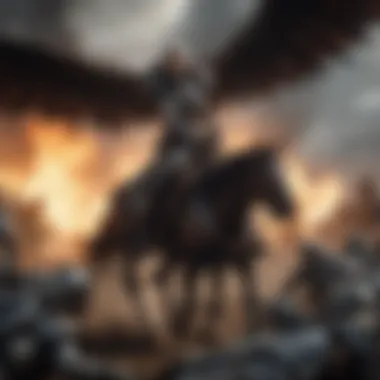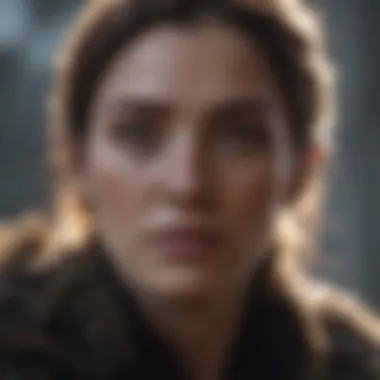Analyzing the Conclusion of Game of Thrones Season 8


Intro
The last season of Game of Thrones stirred up quite a whirlpool of discussions among fans, weaving a tapestry of reactions that spanned from adoration to disdain. As the show wrapped up its eight-season odyssey, the finale was not merely an end; it was a statement that attempted to encapsulate the larger-than-life essence of both the series and the story of Westeros. For those who journeyed through the sprawling narratives full of betrayal, honor, and dragons, the final chapter demanded an insightful exploration.
In this article, we will peel back the layers of Season Eight, examining the nuanced character paths, pivotal episode moments, and the intricate lore that underpinned the entire saga. We'll also dive into fan theories that sprung up like weeds in the garden of discourse, evaluating the perspectives that emerged among the dedicated fans and interested onlookers. From Daenerys Targaryen's descent to the momentous conclusion of Jon Snow’s arc, this final season was a feast—or famine—for many watchers.
Through a meticulous analysis, every element will be scrutinized, providing a holistic understanding for those who found themselves embroiled in the world of Westeros, whether by invested loyalty or sheer curiosity. With that, let us embark on this journey through character dissections and unravel the stories that defined the last hurrah of Game of Thrones.
Overview of Season Eight
The final season of Game of Thrones marks a significant chapter in the expansive narrative of the series. The stakes were at an all-time high, as viewers geared up to witness the culmination of years of political intrigue, bloody battles, and complex character arcs. This section aims to dissect the nuances of Season Eight, laying them bare for both casual viewers and devout fans.
Narrative Structure
Season Eight's narrative structure was notably distinct from its predecessors. Where earlier seasons often unraveled storyline threads gradually, the final installment was packed with rapid developments. This urgency was felt in both pacing and plotlines, with major beats hitting much faster than in past seasons. Each episode carried the weight of anticipation, pushing toward the grand finale.
- Episodic Clarity: The season kicks off with the episode "Winterfell," which starts swiftly, linking back to prior events. The tension is palpable, as old faces and tensions resurface. The audience felt the rush of nostalgia while recognizing the high stakes looming over familiar characters.
- Pivotal Episodes: Each episode served a distinct purpose— from laying groundwork to delivering explosive confrontations. The Long Night showcased an epic battle against the Night King, and The Bells led to one of the most shocking moments of the series: Daenerys’s devastating decision to raze King's Landing.
The narrative style reflects a shift towards a more straightforward approach, eschewing the intricate plotting of earlier seasons. While this arguably allowed for grand spectacle, it sparked debate over the depth of storytelling, an crucial point for fans reflecting on the series’ legacy.
Key Themes
The overarching themes of Season Eight delve into power, identity, and morality, each culminating in a way that sparks contemplation about what leadership and responsibility mean in the face of overwhelming odds.
- The Corruption of Power: Daenerys Targaryen’s transformation provides a stark illustration of this theme. Her descent from a liberator to a tyrant raises questions: Can one wield power without it corrupting them? As her choices lead to catastrophic consequences, it begs the inquiry—what cost comes with ambition?
- Moral Ambiguity: Decisions are rarely black and white in Game of Thrones. Characters like Jaime Lannister evolve, revealing that redemption is a tricky business.
- Legacy and Identity: Struggles for recognition, belonging, and honor echo throughout the season. Sansa Stark’s ascendance to power underscores the theme that true leadership can grow from compassion and wisdom, illustrating a significant contrast to Daenerys’s path.
Overall, Season Eight compacts a series of important touchstones into its narrative and themes, leading to a slew of mixed reactions from audiences and critics alike. Ultimately, this final season served to tie up long-standing plots while raising potent questions about what it means to rule—and the cost of doing so.
Character Arcs and Development
In the realm of storytelling, character arcs and development serve as the backbone of any riveting narrative. In the eighth season of Game of Thrones, this becomes even more crucial as the series approaches its climax. Character choices and transformations not only drive the plot but also resonate deeply with viewers, allowing them to connect with the characters on a more personal level.
By examining these arcs, we can better understand the complexities of characters like Jon Snow, Daenerys Targaryen, and Sansa Stark. Each journey reflects broader themes of loyalty, power, and the often-blurry line between good and evil. Their transformations shed light on how the harsh realities of Westeros shape individuals, ultimately reflecting the series' core messages about human nature.
Jon Snow's Journey
Jon Snow's character journey is a testament to the weight carried by responsibility and the moral conflicts that often accompany it. From his humble beginnings as a bastard raised at Winterfell, he ascends to a position of significant power yet must grapple with his identity and choices. In this season, Jon faces the ultimate betrayal: learning the truth of his parentage as Aegon Targaryen, which shifts his perspective on loyalty and legitimacy. His obligation to protect the realm brings him to fatal choices, ending not just in a personal struggle but carrying the weight of the kingdom's fate.
- To Jon, the burden of leadership is heavy. His internal conflict can be observed when he must decide between his love for Daenerys and the necessity of stopping her destructive ambition.
- The climactic moment of murder he commits points towards not just a personal sacrifice but illustrates the harsh implications of power misuse.
"Jon Snow stands at the crossroads of duty and desire, depicting the agony of choice in a world steeped in betrayal."
Daenerys Targaryen's Transformation
Daenerys' journey throughout the final chapter is perhaps the most dramatic shift of all. Starting as a hopeful liberator, she transforms into a formidable ruler, consumed by ambition and vengeance. After the devastating loss of her closest allies, her descent into brutality highlights how trauma can warp even the brightest aspirations.
- The turning point occurs at King's Landing, where mercy fades under the guise of revolution. Her infamous speeches serve to ignite both fear and loyalty but ultimately lead her down a path of destruction.
- Daenerys’ relationship with fire, signifying both her Targaryen lineage and her passion, evolves to embody her fiery wrath rather than the nurturing force it once represented.
Sansa Stark's Rise
In stark contrast, Sansa Stark's arc is one of empowerment and resilience. From a naïve girl dreaming of courtly love, she transforms into a politically astute leader, embodying wisdom learned through suffering. Her experiences in King's Landing, being dehumanized and manipulated, forge her into a strategic thinker, crucial for the survival of House Stark.
- Throughout the season, Sansa’s rise signifies the power of experience. She effectively navigates the treachery of court politics, showcasing her transition from victim to victor.
- Her ability to discern trust and loyalty makes her a vital player in the battle for power, urging her to advocate for her people and protect the North at any cost.
In summary, the character arcs in season eight not only echo the intricate groundwork laid in preceding seasons but also prompt the audience to reflect upon the nature of power and ethics. Through Jon, Daenerys, and Sansa’s journeys, Game of Thrones presents a multifaceted exploration of what it means to rise, fall, and ultimately reclaim one’s agency in a world wrought with chaos.
Major Plot Points
The climax of Game of Thrones hinges on several major plot points that serve to articulate the narrative’s progression and character development. These milestones in Season Eight are pivotal not only in shaping the resolution of the story but also in reflecting the greater themes of power, sacrifice, and morality that the series has long explored. Focusing on these key elements, viewers can appreciate how the culmination of events resonates with the overarching narrative while setting the stage for the franchise’s future endeavors.
The Night King's Fall


The Night King's defeat marks one of the most anticipated moments in the series, serving as an apex of tension built over many seasons. The character was a symbol of existential dread, embodying a threat that transcended the petty squabbles of the living. His elimination in the Battle of Winterfell was a turning point that, although shocking to some, provided a resolution to an arc that began in earlier seasons.
In terms of storytelling, this moment demonstrates a significant shift. Heroes and heroines united against a common foe is a classic narrative device, and the way Arya Stark delivered the final blow showcases her growth from a girl seeking revenge to a crucial player in saving humanity. It emphasizes how intertwined the fates of these characters have become, delivering not just spectacle but a hefty dose of emotion.
"The long night may have ended, but the implications of its battles and losses linger, shaping the future of Westeros."
This event prompts viewers to reflect on the themes of sacrifice and the cost of victory, encapsulating the series’ hallmark: that all triumph comes at a price.
King's Landing Confrontation
The confrontation in King's Landing represents the heart of moral ambiguity that runs through the series. After Daenerys Targaryen's transformation, the siege embodies an internal and external battle that puts everything the characters have fought for at stake. Daenerys, driven by a complex mix of justice and vengeance, unleashes her fury on the city in an unforgettable display of her power.
Here, the narrative innovation lies in its refusal to conclude with clear-cut heroes and villains. Instead, viewers are forced to grapple with the moral implications of Daenerys's choices. The devastation raises questions about redemption and what it means to be a ruler. Is the pursuit of power worth the bloodshed? These are not new questions for the genre, but the manner in which they are addressed, alongside the ramifications of Daenerys’s actions, leaves a lasting impact.
The Iron Throne's Fate
The fate of the Iron Throne provides a fitting resolution wrapped in irony. After all the blood, treachery, and ambition associated with it, the throne goes up in flames, paralleling the chaotic journey of the series from its inception to its conclusion. This destruction not only signifies the end of a historical cycle for Westeros but also hints at a radically different governance model moving forward.
As characters grapple with the loss of the throne's power, this moment of destruction serves as a symbolic liberation. The final council scene in the series paints a picture of shifting priorities: governance based on responsibility rather than inherited entitlement. It signifies a departure from the throne as the ultimate power symbol, echoing the possibility of new beginnings. Such a conclusion aims to inspire discussions on authority dynamics in a post-Westeros landscape.
In summary, these major plot points are integral to the fabric of Season Eight. They not only hinge on the events leading to the series conclusion but also raise critical questions about power, choice, and the moral complexities of humanity itself. The revelations, twists, and turns in this final chapter have sparked much debate and set a noteworthy stage for future explorations in the Game of Thrones universe.
Viewer Reception
The reception of Season Eight of Game of Thrones is pivotal in comprehending its significance and enduring legacy. Viewers, critics, and fans alike formed a diverse tapestry of opinions, ultimately reflecting broader societal themes and personal expectations. Understanding this reception not only sheds light on how the season was viewed during its release but also indicates how it might influence the show's place in popular culture over time.
Critics' Perspectives
Critics provided a wide range of insights into the final season, often diverging sharply based on their expectations versus the actual outcomes. Some praised the ambitious scope of the visual storytelling and the high production values that the show maintained. The cinematography, particularly in the battle scenes, received a nod for its breathtaking visuals and attention to detail. However, many critiques tackled the pacing and the perceived rush in wrapping up character arcs. For instance, where fans once saw meticulous character development, the conclusion felt abrupt to some who hoped for more nuance.
According to a review from Forbes, a significant point of contention was the character choices made in the penultimate episodes. Critics argued that these decisions seemed inconsistent with the histories they portrayed—a feeling echoed by many loyal viewers. Therefore, the critical reception often hinged on expectations built over the preceding seasons.
Fan Reactions
Fans exhibited a mixed, yet passionate, response to the season. Many took to online platforms to express their views, resulting in heated debates. Some viewers were willing to embrace the conclusions reached, celebrating moments of action and high drama, while others voiced disappointment, feeling that the show had lost the intricate political and character nuances that initially pulled them in.
A notable example is the fate of Daenerys, which ignited a firestorm of debate across social media. Comments on Reddit echoed those sentiments, with a variety of interpretations, alternate endings, and imaginative plot pathways proposed by die-hard fans. This illustrates how invested the fan base remains, showing their desire for satisfying conclusions and coherent storylines.
Online Discourse
The online discourse surrounding Season Eight transformed into a vibrant echo chamber where diverse opinions collided. Platforms such as Facebook and Reddit became central hubs for discussions, analysis, and even heated arguments about plot points and character deviations.
There was an outpouring of fan theories following each episode, with reaction videos and breakdowns almost becoming a subgenre of their own. Fans dissected everything from subtle visual cues to character dialogue, making a point to compare the season against earlier narrative builds.
"The discourse surrounding the season revealed not just disappointment but also a search for meaning and closure. That speaks volumes about the impact this series has had on its audience."
Alongside critiques and fan theories, several petitions emerged, calling for a remake of the final season. While many found this unrealistic, it underscored the intense bond between the audience and the franchise, highlighting how much was at stake for its loyal followers. The fervor surrounding the conversation not only retained Game of Thrones in public discourse but also set the stage for future spin-offs and adaptations to learn from its complex legacy.
Cinematography and Visual Effects
Cinematography and visual effects play a vital role in the overall storytelling of Game of Thrones, especially in its eighth season. This series was not just a dazzling display of battles and political intrigue but also a visual feast that made viewers feel like they were stepping into Westeros themselves. The ability of visual storytelling to evoke emotion and convey complex narratives cannot be overstated.
Visually, the show raised the bar, blending both practical effects and CGI, creating an atmosphere that resonated with audiences around the globe. From the intricate design of the landscapes to the realistic portrayal of dragons in flight, each frame was crafted with meticulous attention. This is a testament to the team’s dedication to not only entertain but also to immerse the audience fully in this fantastical world.
Epic Battle Scenes
The battle scenes in season eight left jaws dropping and hearts racing. The clash between the living and the dead during the Battle of Winterfell, for example, wasn't just about the physical action; it was also a showdown of emotional stakes. Having the raging blizzard and the darkened sky serving as a backdrop heightened the suspense and urgency of the conflict.
- Lighting and Sound: The use of low light and shadows added a sense of foreboding, echoing the themes of loss and desperation. Batteries of vibrant sounds emphasized the chaotic nature of the fights. The cacophony of clashing swords, dragons roaring overhead, and the cries of the soldiers were woven so skillfully that you felt the adrenaline coursing through your veins.
- Cinematographic Techniques: Techniques like long takes created an anxious feeling of being in the midst of the chaos. These choices allowed viewers not just to observe the battle but to experience the terror and intensity firsthand. The handheld camera work, particularly, brought a gritty realism, making each combat encounter seem personal and visceral.
Symbolism in Visual Storytelling
Visual storytelling often carries underlying symbolism, and season eight is no exception. One memorable instance was the recurring motif of fire and ice, representing the internal and external conflicts of the characters and the world itself. The juxtaposition of Daenerys’s fire and Jon Snow’s ties to ice embodied this intricate balance.


- Color Palettes: The choice of color in the cinematography supported these themes throughout the season. Colors were strategically selected to represent good versus evil, hope versus despair, and loyalty versus betrayal. Bright hues during moments of triumph seemed almost like a fleeting memory in contrast to the darker tones that accompanied tragic events.
- Framing and Composition: The way scenes were framed also held meaning. For instance, characters caught in extreme close-ups often highlighted their emotional turmoil or pivotal decisions. This design not only enriched character development but also invited viewers to grapple with the same moral dilemmas that the characters faced.
"In the realm of commitment to detail, Game of Thrones stands unrivaled; its visual storytelling carries the weight of every battle and betrayal."
Overall, the cinematography and visual effects in the final season of Game of Thrones were essential in elevating the narrative. They played a crucial role in shaping the viewer experience, drawing us deeper into the world of Westeros, capturing the nuances of each character’s journey while amplifying the stakes of the story. This attention to visual detail helped solidify the show’s legacy, making it a landmark in television history.
Music and Sound Design
Music and sound design play a pivotal role in shaping the atmosphere and emotional resonance of any visual storytelling. In the realm of Game of Thrones, these elements acted as both a thread connecting the viewers to the characters and a powerful tool to accentuate the series' most climactic moments. In Season Eight, the soundscape and musical compositions took on new significance as the show wrapped up numerous plots and character arcs, delivering an explosive blend of intensity and intimacy.
Compositional Techniques
Ramin Djawadi, the composer behind Game of Thrones, utilized a variety of compositional techniques that have become synonymous with the series' identity. His ability to blend orchestral movements with cultural motifs mirrors the diverse landscapes of Westeros. For instance, themes associated with various characters often evolve over the seasons, echoing their journeys. As Daenerys Targaryen's arc took a darker turn, her musical theme transformed, incorporating dissonant harmonies that hinted at turbulence within.
This deliberate choice to modify compositions brings forth a unique storytelling angle. Take for example the use of the piano; in Season Eight, it often carries a haunting quality during moments of reflection, such as Jon Snow's internal struggles. This technique engages the audience's emotions, inviting them to feel alongside the characters. Similarly, the use of traditional instruments, like the drum and lute, adds an authentic feel that roots the series in its medieval fantasy setting, despite the grand narratives unfolding.
Impact of Soundscapes
Soundscapes in Game of Thrones are not just background noise; they are crucial for establishing mood and enhancing the storytelling experience. The intricate layering of sounds—from the clashing of swords to the distant cries of dragons—creates an immersive environment that pulls the audience into the gritty world of Westeros.
In Season Eight, battlefield scenes were underscored by heavy bass rumbles, which heightened tension and made every clash feel more visceral. In contrast, quieter moments shared between characters were often highlighted by gentle ambient sounds, fostering intimacy and connection.
"Sound is one of the most powerful tools in storytelling, able to evoke emotions and reactions even before words are spoken."
The decision to incorporate silence strategically is another sage choice made by the sound design team. For example, in emotionally charged scenes, fading background noise places the spotlight on emotional dialogue, compelling the audience to really tune into the nuances of the conversation. This manipulation of sound not only enhances narrative depth but also serves to engage viewers on an emotional level, crafting a multi-layered viewing experience.
The careful balance of music and sound design enriched Season Eight, capturing the weight of concluding this epic tale. The confluence of these elements ensured that each beat, each moment resonated deeply with both the casual viewer and the die-hard fans alike.
Themes of Power and Ethics
The final season of Game of Thrones intricately weaves the nuances of power and ethics into its narrative. These themes not only serve as the backbone of the plot but also compel viewers to question the moral fabric of leadership and the cost of ambition. When we think about the characters, their decisions often unfold the stark truth about power dynamics in a world fraught with conflict and betrayal.
A key aspect to examine is how the pursuit of power impacts relationships among characters. Many find themselves tangled in a web of deceit, leading to tragic downfalls. The notion of what is right or wrong, just or unjust, becomes blurred as characters navigate through complex situations. This thematic exploration ultimately resonates with audiences, inviting them to reflect on the ethics of leadership and the personal sacrifices involved.
Moral Ambiguity
Moral ambiguity is a defining hallmark of Game of Thrones, especially in its eighth season. Characters are not confined to clear-cut definitions of hero or villain, which fosters a compelling and often unsettling view of their motivations.
Take Daenerys Targaryen, for instance. Her ascent is riddled with actions that reflect a desire for liberation, yet it becomes increasingly difficult to overlook the collateral damage wrought by her decisions. As she navigates her path to power, the audience is forced to grapple with the consequences of her choices. This complexity keeps viewers on their toes, as one might root for her cause yet simultaneously recoil at her means. Understanding her moral ambiguity paves the way for deeper audience engagement.
Similarly, characters like Jaime Lannister embody this concept vividly. His character arc sees him shift from a perceived villain to a character striving for redemption. His choices reveal a profound inner turmoil.
"The things we do for love, that leads us to make the choices we wear like scars" - demonstrating how love and morality can often be at odds in Westeros.
This intricacy enriches the viewing experience, as it reflects real-world dilemmas where motivations may not align neatly with ethical standards.
Consequences of Betrayal
The consequences of betrayal form a critical pivot in the eighth season, showcasing the devastating impact of broken trust on both personal relationships and broader battles for power. Characters grapple with the effects of treachery, which often reverberates far beyond the initial act. Betrayal becomes not just a plot point but a thematic catalyst that drives character decisions and plots alike.
One notable example of this is Bran Stark's journey. His past relationships and alliances, marred by betrayals—particularly from the likes of Littlefinger—bring forth the question of loyalty. The weight of being a warg and the knowledge of connections across time complicate Bran’s sense of ethics, leading to morally ambiguous decisions that reflect his evolution.
Furthermore, characters such as Cersei Lannister demonstrate how betrayal causes ruin. Her arc is steeped in the realization that those closest to you can quickly become your adversaries. This repeated pattern highlights that treachery often leads to isolation, further extending its implications to the very fabric of Westeros’s political landscape.
In summary, the themes of power and ethics in Game of Thrones do not merely serve as background commentary; they are integral to both plot progression and character evolution. The impact of these themes resonates strongly, challenging viewers to think critically about the moral complexities in their own realities.
Comparative Analysis with Previous Seasons
In discussing the Comparative Analysis with Previous Seasons, we delve into how Season Eight of Game of Thrones resonates within the broader context of the series' narrative foundations. This examination highlights the evolution of storytelling, character dynamics, and thematic consistency across the entirety of the show, showcasing not just the distinct choices made in the final season but also their implications when viewed through the lens of past installments.
Evolution of Storylines


The journey from the very first episode to the eighth season reveals a tapestry of interwoven plots and character arcs that have matured immensely. Early seasons were often characterized by political maneuvering and intricate character development, building a deep sense of investment in the various factions vying for control in Westeros. The narrative was rich with twists, unexpected alliances, and betrayals that kept viewers on the edge of their seats.
However, in the final season, particularly during the tail end, many fans felt that the pacing quickened, leading to a sense of rushed conclusions. Characters like Jon Snow and Daenerys Targaryen underwent rapid transformations, arguably removing some layers that had been carefully cultivated over the years. This swift evolution left many questioning whether the series managed to retain its intrinsic storytelling essence or if it opted to prioritize spectacle over character depth. The fate of discussions surrounding these storylines often reflects a yearning for the slow-burn drama that defined the initial seasons, bringing forth the question:
Did the final season serve as a fitting conclusion, or did it erase the meticulous buildup of previous arcs?
Character Consistency and Growth
A core value of Game of Thrones has been its commitment to complex character development. In past seasons, viewers watched as characters navigated the chaotic landscape of power and morality, often facing dire consequences for their choices. However, many fans observed a divergence in the portrayal of major characters during Season Eight, particularly with regard to consistency.
For instance, Daenerys' transition from a liberator to a tyrant—while foreshadowed—felt overly abrupt to some viewers. The moral dilemmas that once shaped her decisions seemed overshadowed by a singular goal of dominion over Westeros. Meanwhile, characters like Sansa Stark, who began her journey as a naive girl, emerged as a seasoned leader, displaying growth that was praised yet seemingly contrasted with the rapid descents of others.
The contrast in character arcs invites analysis around what it means for Game of Thrones to be a narrative steeped in moral ambiguity and the consequences of choices. While some characters experienced significant growth, others' shifts raised questions about character integrity and continuity. This disparity allows for a rich discussion on how Finale Eleven eventually juxtaposed itself against previous seasons:
- Critical Growth: Understandable, profound transformation in various characters.
- Consequential Abruptness: Several transitions felt too sudden, leading to mixed feelings about character arcs.
- Viewer Expectations: Audiences who invested in long-term arcs felt betrayed or satisfied by different endings.
The examination of characters in this comparative light serves not just to critique Season Eight but to illuminate the complexities that have drawn audiences to this rich narrative world throughout the years. In weaving these threads of analysis, a deeper understanding of the choices made in the last season unfurls, creating a dialogue that continues to engage both long-term fans and those encountering the series for the first time.
Cultural Impact and Legacy
The cultural phenomenon of Game of Thrones extends far beyond its screen time, impacting diversity of realms, from television media to social conversations and even the intricacies of fantasy literature. As we sift through the threads of Season Eight, a culmination of complex narratives and tumultuous character arcs, it becomes paramount to understand how this season has shaped the cultural landscape. This segment engages with the specific elements, benefits, and notable considerations regarding the lasting cultural imprint of the series.
Influence on Modern Fantasy
Game of Thrones has undeniably redefined modern fantasy television. With its intricate character relationships and a web of political intrigue, the series paved the way for future shows that aim to capture the depth of human emotions intertwined with a fantastical backdrop. Other productions, such as The Witcher and Shadow and Bone, have emerged, showcasing characters that mirror the moral complexities and harsh realities seen in Westeros.
- Complex Narratives: The storytelling woven in Game of Thrones challenged the conventions of fantasy where heroes triumph unscathed. Characters often faced dire consequences, prompting audiences to reevaluate their definitions of morality. This shift echoes through recent narratives that eschew simple good versus evil arcs.
- Diverse Characters: With a diverse ensemble cast, this series broadened the appeal of fantasy. Dany's rise and Jon's reluctance to embrace his destiny reflected a range of human experiences that viewers could relate to beyond the realm of dragons and knights. This narrative style has pushed upcoming fantasy works to prioritize character depth over traditional archetypes.
The influence is palpable; one doesn't just consider Game of Thrones as a series but as a touchstone that has irrevocably altered the fabric of television narratives in the fantasy genre.
Merchandising and Fan Engagement
The commercial aspect of Game of Thrones cannot be overlooked; it fostered a massive merchandising empire that went hand-in-hand with its narrative success. From action figures to clothing lines, the accessibility of Game of Thrones products allowed fans to immerse themselves in the world of Westeros beyond the screen.
- Merchandise Variety:
- Engagement through Social Media: Platforms like Reddit have become hotspots for discourse, where fans discuss everything from character conspiracies to theories about future spin-offs. Groups on Facebook also unite viewers, keeping alive the conversations initiated by the show, allowing fans to relive scenes and discuss their emotional impacts.
- Clothing: Houses like Stark and Targaryen have their jerseys and stylish cuts.
- Collectibles: Miniature dragons and Iron Throne replicas are often sought after in conventions.
- Board games: Titles such as A Game of Thrones: The Board Game allow fans to play out their own politics and strategies in Westeros.
"In many ways, the legacy of Game of Thrones is the ability to extend the narrative, allowing fans to engage on a level that transcends the screen."
The cultural footprint left by Game of Thrones is a testament to how storytelling, when done with care and complexity, has the power to reshape not only the genre but also the ways in which audiences interact with it. As we move forward, it is crucial to recognize these influences while also anticipating how they will transition into future storytelling ventures.
Looking Ahead: Spin-offs and Continuing Narratives
The final season of Game of Thrones left fans with a hearty mix of satisfaction and bewilderment. It's worth pondering what lays ahead after the curtain call. Spin-offs have become the topic of much discussion, as they hold the potential to both expand on the lore cherished by fans and venture into entirely new territories within this vast universe.
Evaluating the importance of these spin-offs, it's clear that they provide a lifeline to a world many are not ready to let go of. Rather than merely rehashing what was, these new narratives promise to explore uncharted dynamics, fresh character conflicts, and the rich tapestry of Westeros and beyond. Viewers are hungry for more stories, whether that be a deep dive into the Targaryens or a look at the mysterious lands east of Essos.
Upcoming Series Announced
Among the announced projects, House of the Dragon stands tall, aiming to chronicle the rise of the Targaryens. This series is set to take place a couple of centuries before Daenerys took her first breath, exploring the events that led to the infamous civil war known as the Dance of the Dragons. For many, this is not just another spin-off; it’s a peek behind a gilded curtain, into the bloodlines and battles that shaped the very foundation of famed houses.
Other titles linger on the horizon, like The Tales of Dunk & Egg, which revolves around the adventures of Ser Duncan the Tall and his squire, Egg, who will one day become King Aegon V Targaryen. This lighter narrative, bringing a charming mix of humor and heroism, showcases a different side of George R.R. Martin's storytelling, grounded in friendship and chivalry.
"New worlds and stories are on the horizon, proving that the saga is far from over."
The diverse nature of these upcoming series fuels speculation about ongoing fan engagement and potential for renewed interest in the franchise. Each upcoming series can pave new paths for discussions and even merchandising opportunities, ensuring that Game of Thrones affects pop culture for years to come.
Continuity of Themes
The heart of Game of Thrones was never merely about power struggles or battles won. No, the themes of loyalty, love, sacrifice, and the harsh realities of ambition resonate deeply, and it’s crucial these elements carry through into future tales.
Fans hope to see:
- The exploration of moral ambiguity, where right and wrong blur like shadows in the twilight.
- The futile cycle of power: will new characters repeat the same mistakes?
- Unreliable alliances and the politics that keep fans guessing.
Continuing these motifs allows for a deeper exploration of humanity, ensuring that despite new settings or characters, the essence of what made Game of Thrones compelling is preserved.
The potential for forking character developments in spin-offs can mirror lessons learned in the main series. As such, existing and new audiences can witness how choices echo through time, thus keeping the perpetual dance of destiny close at hand. This interconnectedness serves to create a rich and meaningful experience for all viewers, ongoing threads that bind the past with what is yet to come.



